Who is IQM?
IQM is the only national inclusion award in the UK. For over 20 years and in over 20 countries, schools, MATs and Local Authorities use the Inclusion Quality Mark to recognise exemplary inclusive practice.
Get in touch for your FREE school information pack today.
The Bridge School Achieves Centre of Excellence
January 20, 2023
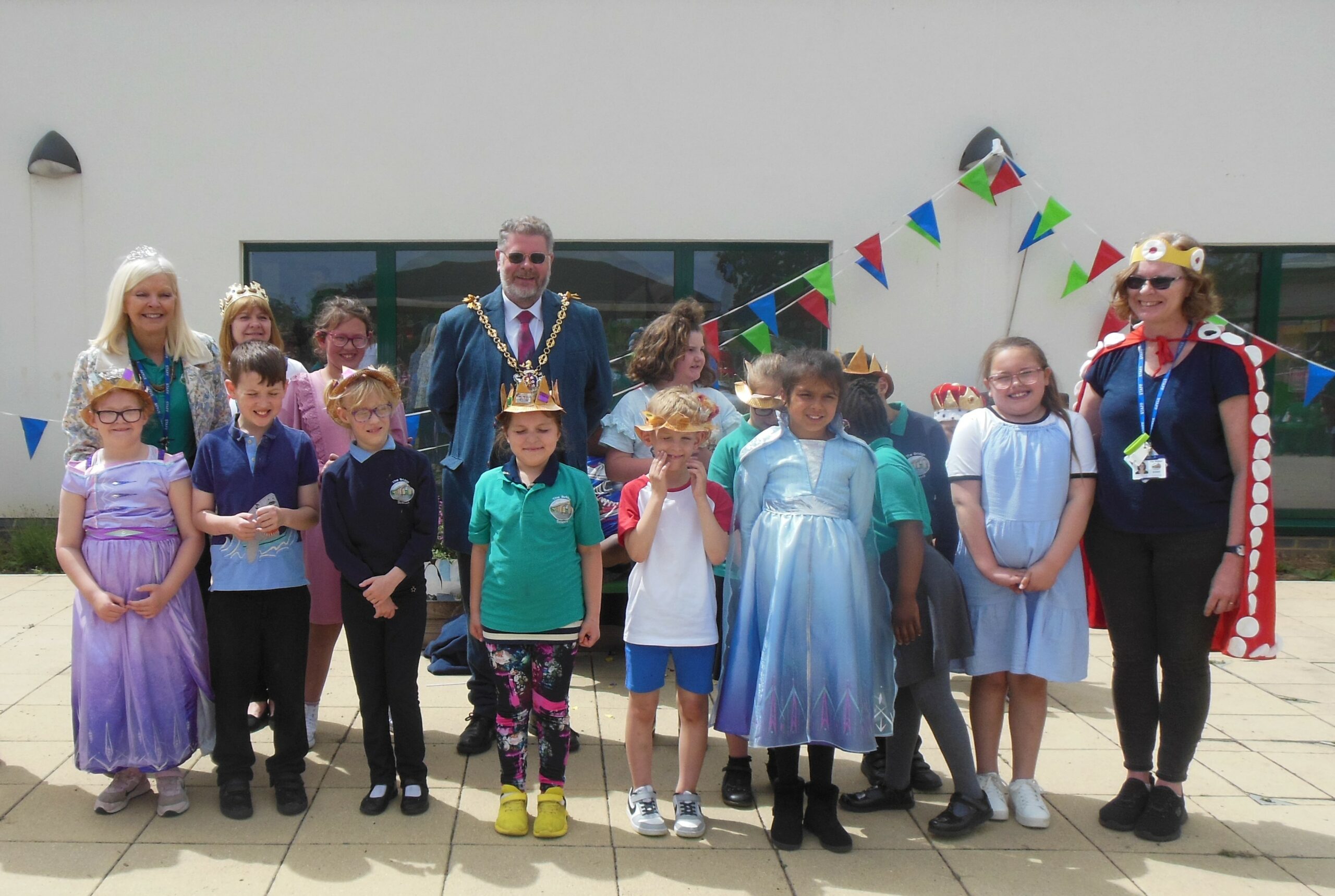
The Bridge School has achieved the Inclusive School Award with Centre of Excellence Status.
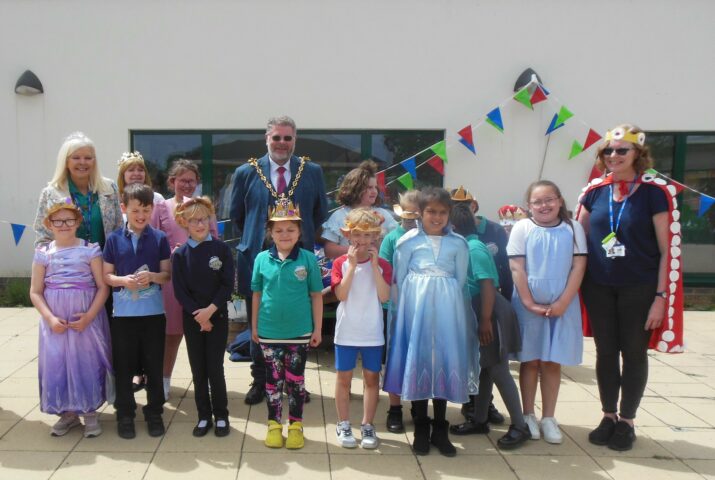
Excellent Example of Inclusive Practice
The Bridge School is an excellent example of inclusive practice. The school is a Special School for 166 Severe Learning Difficulties (SLD) pupils aged 4 to 16. All pupils have an EHCP and a range of complex and multiple disabilities with more than 70% pre- or non-verbal. Every pupil is valued and the school endeavours to celebrate their unique abilities, recognise every achievement, help them to move on to be as independent as possible, live safe, fulfilling and enjoyable lives.
Inclusivity is one of the school’s core published values and it sees its role as extending far beyond teaching by raising the profile of its pupils to be accepted into the community and helping families access all the provisions available to them to facilitate full inclusion. The school building is purpose built to facilitate inclusion. It has quiet corridors for those effected by noise, wide corridors for those with walking challenges or who use a wheelchair, bright, light rooms with anti-glare glass, so that the visually impaired are helped as much as possible, mini-buses with wheel-chair access and hoists are installed in the shared spaces so that children may all be fully included. The leadership team want to further develop additional facilities to include a post 16 facility and an expansion of the KS3 and KS4 provision in the future.
Good Links with the Community
Inclusion is evident in all aspects of the school’s work and there are good links with the community. The Headteacher works effectively with her leadership team, the Governing Body, The Trust, parents and staff to ensure that everyone has similar aspirations for children at the school. 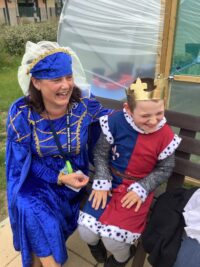
The school’s values, Independence, Kindness and Compassion, Inclusivity, Courage, Positivity and Respect, reflect the attitudes and aspirations of all staff for the pupils. Inclusivity is at the heart of everything the school does. The school believes that everyone can learn, achieve and has the potential to be successful. Positive relationships are the key to success and are underpinned by mutual trust, respect and caring for one another.
The school has high expectations in everything they do. There is a bespoke programme for each pupil to ensure their needs are met and this programme might be adapted daily dependent on the attitude, emotional need and mental wellbeing of the individual pupil. The Governors are experienced and their understanding of the key issues relating to school improvement also impact on outcomes for children. The Chair of Governors is an experienced professional and works well with the Headteacher and the other Governors to address the inclusive ethos within the school. One Governor spoke of ‘the resilience of staff’ and how ‘they were part of a family’.
School Values
There is a consistency of display in classrooms and shared areas which shows a balance between celebrating children’s work, celebrating their differences and providing a focus for learning. The displays in classrooms focus on WOW work, Our Learning, Rewards, Aspirations (what are we aiming for?), Golden Rules, Communication, Visual Timetables, writing and numeracy.
The school values are highlighted around the school and photographs of pupils from the school are celebrated in corridors. Other well executed displays in corridors include Healthy Teeth, Umbrellas in Art, We are all Different, Light and Shadow and Different Habitats.
The school also has several breakout rooms including sensory rooms, intensive interaction rooms, a cookery room, reading rooms, a music room and learning pods for a range of individual and group activities. The rooms are usually well resourced with padded equipment, light settings to suit various activities and moods and hoists to cater for all pupils. The school also has an indoor, heated swimming pool with changing rooms, showers and hoists. All the primary aged children use the pool regularly as do those older children with specific therapeutic needs. Older children are transported to a swimming pool in Ipswich which is deeper for better swimmers. The pool is also used by the NHS for older patients and by primary schools in the area on all five days of the week.
Curriculum Designed to Inspire
There is a focus on a bespoke, differentiated and individualised curriculum offered to every child. The CREATIVE curriculum is designed to inspire, motivate and develop pupils’ characters and help them succeed in the modern world.
It is more than reading, writing and maths, although those areas are important. It is always about total communication with visual and auditory cues and the use of Makaton using symbols, signs and speech and pictures to communicate. The school has developed a total communications policy with the NHS which includes everyone. There is no judgement or negativity.
There is a skills continuum developed by the school which focuses on those areas that the school has decided are important for their pupils and their needs. Staff are looking for a consistent response. They are trying to understand the difficulties that the pupil must deal with and those areas that might have made them disaffected in the past. In addition, the curriculum offers a range of enrichment and real-life experiences beyond the classroom within the local community.
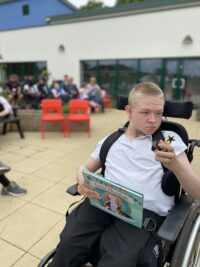 Real shopping trips, trips to the library, visits to factories, walks in community parks, visits to the theatre and cinema are some of the activities undertaken to offer pupils contact with the local community and to provide the local community with opportunities to make contact and understand the strengths of the pupils from the school. The pupils also have a range of jobs in and around the school on a rota basis such as recycling, litter picking and managing displays.
Real shopping trips, trips to the library, visits to factories, walks in community parks, visits to the theatre and cinema are some of the activities undertaken to offer pupils contact with the local community and to provide the local community with opportunities to make contact and understand the strengths of the pupils from the school. The pupils also have a range of jobs in and around the school on a rota basis such as recycling, litter picking and managing displays.
The school provides a wide range of extra-curricular activities during lunchtime which enhance the curriculum. Each class has a Forest School session each week which provides children with an excellent outdoor experience where they can also see the change in seasons. Safety, independence, mutual trust and ‘fun’ with nature are all highlighted. Staff are Forest School trained and pupils are suitably clothed to adapt to all weathers. Lesson planning illustrates that staff are well informed about the needs of the children. Plans are built around EHCP Outcomes and Aspiration Targets are reviewed and updated half-termly. This personalisation is geared towards three different levels: engagement, semi-formal and challenge, depending on the child’s cognitive ability.
Pupils engage in lessons at their own pace and ability with pictures, symbols and words provided for pupils depending on their need. Pupils have access to technology by using iPads and interactive software and assessment systems such as Mathletics and Literacy Planet. Some pupils have Talk Pads to aid communication. The Sports and School Awards take place annually with activities that every pupil can take part in, highlighting the school’s inclusive values and ensures every pupil is rewarded for their endeavours.
Support Staff are Important
Support staff are important and have many different roles within the lesson supporting individuals and groups of pupils where appropriate. They are also able to look after personal care and behaviour needs. The use of rebound therapy which is a programme using trampolines to provide opportunities for enhanced movement patterns, therapeutic positioning, exercise and recreation for a wide range of users with additional needs was observed in the school hall. The Rebound Therapist engaged a normally reluctant pupil on the trampoline in an extremely effective way.
Each pupil has their individualised assessment grid which relates to their EHCP targets. There is a daily form of assessment and reward system which keeps an up-to-date record of children’s achievements and constantly motivates children to succeed. The Earwig online platform provides a bespoke assessment programme with a range of categories. There are assessments at the beginning of topics and impact sheets at the end of the topic to assess what children have learnt.
Parents have a live, real-time access to the programme offering them a comprehensive understanding of their child’s progress and activities within school. The WALTS and WILFS (We Are Learning to and What I Am Looking For) are shared with all pupils at the beginning of lessons and staff employ a range of strategies to engage pupils. There is feedback from teachers in lessons to develop an ethos of praise, engagement and positive attitudes always.
The personal development of pupils is a priority for staff. Social interaction, ways of behaving responsibly and behaviour towards others are vitally important.
Dedication of the Staff
The dedication of the staff and their empathy with their pupils are role models for the pupils. The school values are constantly reinforced and the positive relationships and understanding the needs of others are developed further in KS3 and KS4. The emotional state of learners and staff is crucial to pupil engagement and learning. Staff wellbeing is addressed regularly. Staff have access to 15 minutes mindfulness each week to promote positive attitudes. Half termly Super Star Awards for staff, who are nominated by their peers, is another way in which staff wellbeing is addressed.
The Deputy Headteacher and welfare team monitor attendance weekly to ensure student attendance is of the highest priority. Good communication with parents and work with outside agencies support students and families where attendance or school refusal may be an issue. Half-termly certificates are used to celebrate attendance. School attendance is good.
Parents and carers are very positive about the work of the school. They appreciate the way staff work with pupils to understand their specific needs and provide them with a positive experience of education. The school sees the relationship as ‘a learning partnership’. There is good communication with parents and carers, they can message at any time to express any anxieties.
One parent interviewed stated, ‘They are just so caring- they are relentless in making sure everything is okay!’ Another parent said that ‘communication is fantastic!’ One parent, who is also a hairdresser in school on a Tuesday, spoke enthusiastically about staff. ‘They all have halos – they can’t see their halos, but we can.’
The parents also spoke highly of the office staff who ‘never let you down- they always want to help.’ The Earwig online platform was praised as it provided up to date information about what was happening in school and provided information about each child’s progress. These parents could not praise the staff enough for their dedication, endeavours and attention to detail to ensure their children received a positive education. 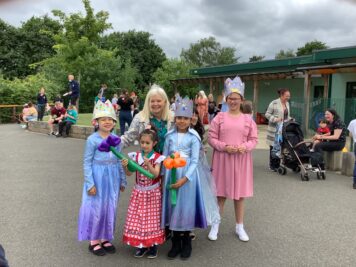
Excellent work is carried out with families, pupils and the community generally to ensure that children are cared for and valued. There are good communication systems which give parents and carers confidence in the school and in its support for their child’s needs. Email, texting, newsletters, reports to parents as well as one to one conversation daily keep parents and carers regularly informed about their child’s education, welfare and needs.
The school cafe has recently opened. It is a cafe run by staff and pupils that is open to the local community. It is in its early stages of development, but it has a great deal of potential to reach out to the local community. It is set in its own building on a piece of land with easy access to the road and will be an area that will be beneficial for both pupils engaging with the local community and for local people engaging and understanding the young people in the school. This is another way in which the school engages with the local community.
Work and Life Skills
Pupils can develop work and life skills and are encouraged to use local shops, libraries and sixth form colleges. They also visit natural environments such as coastal areas and forests to develop an understanding of different environments to their own. Visits to historical buildings such as Framlingham Castle in Suffolk and trips by public transport to different workplaces provide a wide range of experiences for pupils. The Ipswich Film Festival and arts events are other visits which support the arts curriculum.
The school’s ‘My World curriculum’ provides opportunities for children to explore different cultures, religions and countries. The local church has a good relationship with the school and the school wants to engage with other faiths to give the pupils a broad understanding of religions and cultures. The curriculum overviews have detailed links to world religions and cultures.
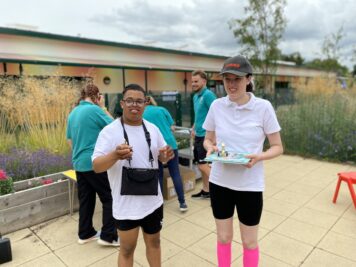
Outstanding Example
The Bridge School is a particularly outstanding example of a school committed to meet the needs of its pupils and is outstanding in its commitment to and implementation of inclusive practice.
All staff have an enthusiasm and passion for their part in the learning and lives of the pupils at the school. They are dedicated and positive about the futures of their pupils and would like to further promote the school’s expertise amongst the Trust’s mainstream schools and via the Trust’s training facility.
Everyone is committed and wanting to do the best they can for the pupils at The Bridge School. They provide an outstanding, caring environment for pupils where high expectations have a huge impact on their progress and wellbeing. The Self Evaluation Report reflects the high quality of evaluation that exists in the school. It is comprehensive and reflects the school as seen by the assessor.
Find out more about the IQM Inclusive School Award
If your school is interested in obtaining the IQM Inclusive School Award or you wish to talk to a member of the IQM team please telephone:
028 7127 7857 (9.00 am to 5.00 pm)
or email: info@iqmaward.com for further details.
Other Posts

About IQM
The only national award for inclusion in the UK, IQM has been committed to recognising exemplary inclusive schools for over 20 years and in over 20 countries around the world. The three awards allow schools and organisations to dcelebrate their inclusive practice against nationally recognised framework.
Site Links
© 2025 Inclusion Quality Mark | website developed & cared for by digidoda


